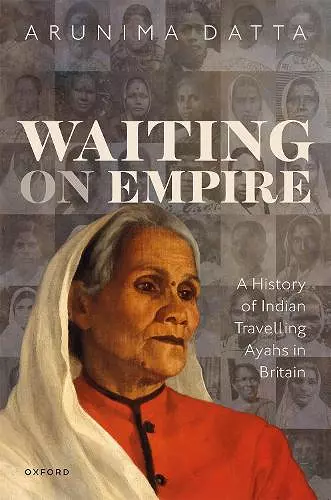Waiting on Empire
A History of Indian Travelling Ayahs in Britain
Format:Hardback
Publisher:Oxford University Press
Published:3rd Aug '23
Should be back in stock very soon

The expansion of the British Empire facilitated movement across the globe for both the colonizers and the colonized. Waiting on Empire focuses on a largely forgotten group in this story of movement and migration: South Asian travelling ayahs (servants and nannies), who travelled between India and Britain and often found themselves destitute in Britain as they struggled to find their way home to South Asia. Delving into the stories of individual ayahs from a wide range of sources, Arunima Datta illuminates their brave struggle to assert their rights, showing how ayahs negotiated their precarious employment conditions, capitalized on social sympathy amongst some sections of the British population, and confronted or collaborated with various British institutions and individuals to demand justice and humane treatment. In doing so, Datta re-imagines the experience of waiting. Waiting is a recurrent human experience, yet it is often marginalized. It takes a particular form within complex bureaucratized societies in which the marginalized inevitably wait upon those with power over them. Those who wait are often discounted as passive, inactive victims. This book shows that, in spite of their precarious position, the travelling ayahs of the British empire were far from this stereotype.
Waiting on Empire is a landmark book, giving long overdue attention to the most significant population of colonized women workers in Victorian Britain. Ayahs enabled British colonizers to maintain families despite their global mobility, critical to the resilience of British imperial rule. This beautifully written book restores these neglected women to the historical record, offering a sophisticated interpretation of women's agency and deftly recasting traveling ayahs as knowledgeable, enterprising, and resourceful skilled workers. * Laura Tabili, Professor of Modern European History, University of Arizona *
This book forever changes the history of domestic colonial service. Datta argues that traveling ayahs are a prism for the workings of imperial power from both above and below. Readers will be stunned by the photographic archive she has curated and by the way she practices care work for the subjects she so brilliantly moves out of the waiting room of history. * Antoinette Burton, author of The Trouble with Empire *
Datta illustrates through her deep archival research that ayahs, far from being passive victims, were highly capable enterprising women. She convincingly outlines how this reality was masked by a prevalent misogynistic imperial discourse that perceived ayahs not just as domestics but also as domesticated, docile and subservient. Datta through her meticulous research counters this discourse. This book is an important corrective to bring sharply into view travelling ayahs' enterprising resilient capacity. It is an important and necessary intervention that holistically reveals the important role ayahs played in the economy of empire. * Florian Stadtler, H-Soz-Kult *
Waiting on Empire is a crucial introduction to the field, not least because it implicitly points out that what happens to passengers in ports is relevant to the intervening voyage. Datta productively 'extends' the sea's margins and the ship's 'walls'. She puts intersectionality in the maritime picture. * Jo Stanley, International Journal of Maritime *
In this ground-breaking study of Britain's historical relations with South Asia, Prof. Datta has recovered the voices of a previously marginalised group of women. As she argues, "India's travelling ayahs were once a familiar part of the British Empire, providing childcare and other domestic services for the families of the British privileged class as they voyaged between India, Britain, and further-flung imperial realms. * Paul Tonks, Asian Affairs *
Waiting on Empire is at its strongest in its mission of recovery and in giving voice to the voiceless. The second part of the book consists of case studies of 124 traveling ayahs in the 1930s, piecing together snippets of information from the margins of official documents. The level, unblinking gaze in each of the accompanying passport photographs might be taken as a challenge to the reader not to forget the silent cogs in the machinery of empire-a task this book performs admirably. * Brian Lewis, American Historical Review *
ISBN: 9780192848239
Dimensions: 240mm x 162mm x 21mm
Weight: 680g
320 pages